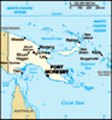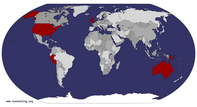Advertisement
Published: June 10th 2013
Security Guards and Puppies The security guards at Kudjip Nazarene Hospital are hired through a third party, Asila Security Services (conveniently abbreviated ASS, with badges places on their hats and sleeves). These guys are pretty nice and friendly when you talk to them, but most of the time they strut around, empowered by their uniforms. Sometimes they carry a bushknife or a club as guns aren't legal in the country. At the front gate, the guards will often question each person entering the hospital area. They will act like they're doing you a favor when they let you pass. White people are an exception though; they hurry to open gates for us and greet us. Again, they're really nice guys, they just like having authority. Anyway, one day after I finished in ER, I made the very short walk down to the front gate to check how the Maintenance project was going. I noticed that at the security guards' little booth there was a puppy. Loving adorable things, I went over with the intent of taking pictures of the puppy. I didn't get a chance. As soon as I pulled out my camera, these big tough security guards turned into little children. They were asking me to take pictures of them, holding the puppy. I took a few, but the lighting from the sun was absolutely dreadful. I told them that "dispela lait em nogut". So they eagerly ushered me to the landscaping in front of the hospital, full of bright orange flowers. The result was a wonderful picture of five tough security guards; one holding a puppy, another holding a flower, and two others giving me a thumbs up.
Weekend Retreat This weekend, Dr. Mark Tan and I went to Melanesia Nazarene Bible College with Mike and Diane Chapman. The Bible College is about a 15 minute drive from Kudjip. Mike and Diane used to live and work in Kudjip, but they now live on the MNBC campus in Ningi, as Diane is an English teacher there. We came over Friday night and spent the evening playing dominoes, dining on good non poor-people food, and watching Australian rugby on TV. Here you can only get one channel, and it only comes on when the repeater station decides to pay their electricty bill. This is usually right before a rugby game.
On Saturday, I went with Diane, Mark, Kumi, and two other native guys to a singsing in Minj. This singsing was a festival, a competition actually, between different tribes of the region. Each tribe donned their traditional (pre-white people) dress, danced, and sang. Traditional dress, or bilas as it is known in Tok Pisin, is comprised of leaves, feathers from birds of paradise, cuscus fur, pig's tusks, face paint, nose rings, shells, headresses, etc. The tribes would dance to drums and sing. It was really excellent. I had never seen anything like it. I took well over 200 pictures of the event. My favorite were the mudmen from Goroka. The members of this tribe had clay masks, more like helmets, that covered their entire heads. Their bodies were painted with mud and they were minimally clothed with leaves. They slinked around and were silent except for one man, who would slowly move, pause, and click these long, sharpened pieces of bamboo on his fingers. Their silence, combined with the totally concealing masks, made the mudmen very eerie. They carried bamboo spears and pointed them right at me when I held up my camera. This made some excellent pictures. The legend behind the mudmen is that when this particular tribe was warring with another tribe, the warriors buried themselves in the mud. When they arose, they were covered in mud and their enemies fled in terror.
Brian Ginn - Foreign Diplomat This story requires a short preface. Papua New Guinea is made up of 22 provinces - the equivalent of states. Most of my stay in Papua New Guinea has been in Kudjip, which is in Jiwaka Province. Last year, when I was here, Kudjip was part of the Western Highlands Province. May 17, 2012 marked Jiwaka Province Establishment Day. Jiwaka is so named because it incorporates the Jimi, Waghi, and Kambia Valleys; Ji-wa-ka. Anyways, each province has it's own governor, the same as in the US. Today at the festival, the governor of Jiwaka Province was present, and spoke briefly. Diane Chapman wanted to talk to him and thank him for all that he has done for education within the province. According to her, he is actually doing good work in the political arena - something that is pretty rare in Papua New Guinea. PNG's government is rated among the most corrupt in the world. Diane talked to him and she introduced me as a volunteer at Kudjip Nazarene Hospital from the United States. I even got my picture taken with him. This is one advantage of being one of about fifteen white people in a crowd of 2,000 or more. I have now met more governors of Papua New Guinea than I have met governors of the United States
Highlands Community I've been learning more and more about the community-oriented nature of the highlands people, and every day I see a new example. For surgeries and other "expensive" procedures (most big operations costs $60 or so) the individual will go to his or her line and explain the need. The tribe will then pitch in to cover this cost. It is the same way with the bride price exchange that I went to. The entire line of the man's side will contribute a total of 7,000 kina or more in order to purchase the woman from her tribe. The word "brother" here can mean nephew, uncle, cousin, etc. It's all one big family. You can ask someone who they are related to, and they will be able to tell you who and how they are related.
The example of community that I witnessed today came during the time that I was shadowing Dr. Stephanie Doenges. In the maternity ward, a newborn baby had just been adopted by a lady. The mother was present as well. I got the whole story from the adopting mother. She was not able to have children, but the child's biological mother had already had several, so she just gave this child to her relative. Just sharin' the wealth. The child belongs more to the tribe that it does to an individual father and mother.
Frustrations On Wednesday I shadowed Dr. Steph. She is a family practice doctor, but spent a one year fellowship doing OB/GYN, so almost everything that has to do with mothers and babies or women's health is sent to her. We started by making rounds in the maternity ward. In the nursery were seven premature babies, all under 2.2 kilos. Some of these were closer to 1 kilo. That is a tiny baby. Two children had cleft palates, one was bilateral - pretty severe. Steph said that there is a team from Australia that comes through once or twice a year and performs plastic surgeries like cleft palate repair. These children will just have to wait for the team's next pass.
After making rounds, we spent the day back and forth between outpatient and ER. A one-month old baby came into the ER, technically DOA, but we tried to revive him, to no avail. The parents had brought this child to the hospital yesterday and were advised to admit him to the paeds ward, but did not listen. This could have been prevented. It's so frustrating to see lives being lost by easily treatable things. The people wait to come in to the hospital until is almost too late or already too late. It's also frustrating to see the doctors have to tell someone that they don't have the means to treat them. Any out-of-the-ordinary procedure, or anything that requires special equipment is unable to be performed here. The patient's only option is to fly to Port Moresby (which is almost always outside of the individual's means). Things like paediatric heart surgery require a flight to Australia, which is even more expensive. Wednesday, Steph diagnosed a man with renal failure. The only place for dialysis is in Moresby. This man is going to have a significantly shorter prognosis simply because of where he lives.
It's frustrating for me to see this, but it's even more frustrating for the doctors when they don't have the means to treat someone. When explaining particular, untreatable case, the phrase "this would be easily treated in the US" often comes up. The only internal imaging available here is Xray and ultrasound. I've been amazed at how much these physicians can see with an ultrasound. There is good news though. So many of the drugs and hospital materials are donated from first-world countries. Even very expensive chemtherapy drugs like Glivec are donated by pharmaceutical companies. Histology samples are sent to a hospital in the United States which performs all of the pathologies for free. Physicians here send pictures or descriptions of bizarre cases to doctors and researchers at the Mayo Clinic who donate their knowledge and can usually provide answers. It's encouraging to see the international effort.
Updates From Kudjip Today Jordan and Rachel Thompson left for a 4 month home assignment and vacation. This is quite a bummer. Of all the missionaries on station, I have definitely connected with Jordan and Rachel the most. Jordan is quick to listen and slow to speak. He's great for bouncing ideas off of related to hospital Maintenance. Rachel is just the biggest sweetheart; she is very thoughful and she makes fantastic cookies. The good news is that they are both Illinois natives and there is a good chance that I will get to see them (with their fourth-month old, Miles) while they're on home assignment.
Today was the Queen's Birthday (not her actual birthday, just the holiday) and since PNG is part of the British Commonwealth, we observed this by taking the day off. Some missionaries observed this by having tea and crumpets. No work with Maintenance and the hospital was shut down except for emergencies. I spent my morning traveling to Mount Hagen with Jordan and Rachel to see them off at the airport. I also got to visit the illustrious Kofi Kave - the most Western venue I have seen in over a month. Neon lights, fountains in the landscaping, a shaded veranda - not exactly commonplace fixtures around here. The prices were definitely Western too. A cappucino was 12 kina, that's $6 US dollars. The rest of my day was spent enjoying not working. I played a little basketball with some of the missionaries . Later, an hour and a half football game broke out. One nice thing is that no one really keeps score; they just play for the fellowship.
Advertisement
Tot: 0.123s; Tpl: 0.012s; cc: 8; qc: 51; dbt: 0.0785s; 1; m:domysql w:travelblog (10.17.0.13); sld: 1;
; mem: 1.1mb










Jane Maupin
non-member comment
enjoying your blogs
Brian, I love reading of your experiences in PNG. You have a flair for writing and it makes for the most enjoyable reading! I am praying for your health and well- being.